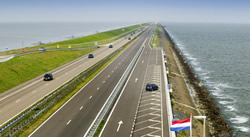
Photo credit: Rijkswaterstaat Ministry of Infrastructure and the Environment
ALEXANDRIA, VA—April 13, 2011. Drs. Joe Manous and Rolf Olsen of IWR gave presentations at an Experts Roundtable on Urban Flood Risk Management at the World Bank. The event took place on 17 March 2011. The purpose of the Roundtable was to discuss the World Bank’s “Global Urban Flood Risk Management Handbook.” The discussion focused on policy directions and technical themes to make the handbook more robust and usable.
Dr Manous spoke in the session on reducing and managing flood risk, presenting ”Flood Risk Reduction: Projects or Systems.” Dr Olsen discussed “Climate Change and Risk-Informed Decision Making” in the session on climate change. Roundtable attendees included experts with a wide range of scientific, engineering and policy disciplinary backgrounds. Geographic representation at the Roundtable was diverse, with participants from the Americas, Africa, Europe and Asia.
Dr. Manous has identified, researched and developed strategic and operational initiatives to improve infrastructure resilience. Dr. Olsen is co-team lead of the USACE Responses to Climate Change Program. He works on developing and implementing approaches and policies to reduce potential vulnerabilities to water infrastructure from climate change. Their expertise can enhance the information in the Handbook for water managers.
More about the World Bank
The mission of the World Bank is to fight poverty and help people help themselves and their environment by providing resources, sharing knowledge, building capacity, and forging partnerships in the public and private sectors. The World Bank provides financial and technical assistance to developing countries for a wide range of purposes, including environmental and natural resources management. The World Bank works with their partners to promote sustainable urban development, which is increasingly important as more than half of the world’s people now live in cities. Their support of water resources activities encompasses water supply, sanitation, agricultural water management, environmental services, hydropower and water resources management.
Learn More: